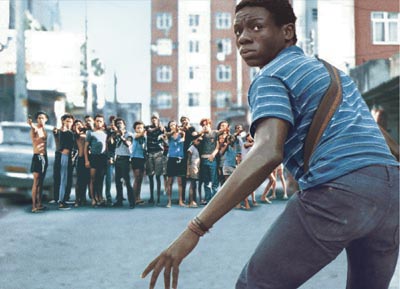I recently watched “Flags of Our Fathers,” a film that mentioned the potential of a photo to win or lose a war. The one at Iwo Jima declared victory for America. Several in Vietnam ended the campaign flat out. And the many by one resident of the Cidade de Deus (“City of God”) told the world they existed.
“City of God” is one of the most culturally significant films in years because it observes one of the worst societies in the world with such great depth and insight. The Cidade de Deus are gruesome slums located in the otherwise picture perfect area of Rio de Janiero and remain unchanged because the people living there are so removed from the postcard image for the government to know or care. The film tells the story of Rocket (Alexandre Rodreigues), a teenage boy that for so long has resisted becoming a hoodlum or dead and now wishes to escape through his love of photography.
The film has a vivid screenplay that tells multiple episodic tales about the town and its residents. It starts interestingly enough, telling Rocket’s story chronologically, but the nature of the film is to back track, linking together these multiple stories so fluidly. Through the same shot, Director Fernando Merielles can create astounding revelations about the characters and their relation to one another. For instance, the mysterious disappearance of a character and another’s rise to power would never be as clear cut if told in order, but the shocking way in which they link almost seem to justify the sudden pounding on a door we’ve already heard three times.
This beautifully woven tapestry of a screenplay not only tells a tragic story but also explains the inner workings of a town that will always seem to be thriving on crime and violence.
One of the more complex characters of the film is Li’l Zé (Leandro Firmino), who has been aching to become the boss of Cidade de Deus since he was a child. In his rise to the top, he has eliminated all his competition and left little room for friends or feelings. He preaches and runs an actually thriving and safe city based solely on crime, but attempt to break the rules of the town with other forms of anarchy or even peace with the rival boss will get you killed. The question is what has Li’l Zé gained? Perhaps he is the most feared person in the most feared town in all the world, but the brilliance of the screenplay seems to explain Zé’s actions as necessities in this kill or be killed society.
So it’s somewhat hopeful and inspirational when we see a person like Rocket that has managed to follow the rules and still escape. Like the overall message, “City of God” is not an entirely miserable film, despite its excessive amounts of action and tragedy. One of the ploys used throughout Brazil is to disguise the slums by painting them bright colors, and we can see some of that idea come out in the cinematography. Much of the film is very bright, punctuated with colors and lighting effects. One of the most crucial and emotionally moving scenes in the film takes place entirely to a strong strobe light that filled the room. The lights kept flashing and the hits and the gunshots kept coming.
This isn’t a film with lots of action, but instead lots of life. Meirelles shows that violence is a way of living in this city, and to say to edit down some of these scenes is to infringe on primary human interactions. There’s no point in sugar coating that problems can be solved with words when in reality they were solved with bullets.
Most powerful yet is the knowledge that the entire film is based on real events from the ‘60s to the ‘80s, not even a fictional story based on the region. It was a society unknown to the world until Rocket showed pictures exposing police corruption and became famous for it. He is the one to escape, but the movie shows that even when tragedy strikes, the bizarre cycle God has set for this town resets itself.
“City of God” does not ask of us to solve the problems in this part of Rio de Janiero. People who try to escape from or break God’s system are destroyed for it, but the Cidade de Deus represents a way of life. The film has made us aware of a society that however horrible, exists, thrives and functions on the same level as the rest of humanity. It says a message about human equality not through race, wealth or even morals but simply natural instincts.
Do not weep for the citizens of Cidade de Deus; weep for those who have not heard of them.
4 stars
